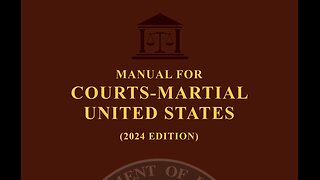Premium Only Content

WAR CRIMES: Supreme Court, Congress, and the DOJ.
King James Bible: Beware of false prophets, which come to you in sheep's clothing, but inwardly they are ravening wolves.
The US Supreme Court, Congress, and the Department of Justice (DOJ, Executive Branch) are the “ENEMY” of “We the People” of America.
LEGAL MAXIM:
The government is to be subject to the law, for the law makes the government.
CHARGES & CLAIMS:
The “ENEMY” (Title 50 US Code 2204) seized by “SEDITIOUS CONSPIRACY” (Title 18 US Code 2384), and weaponized the US Judicial Branch from top to bottom executing “DOMESTIC TERRORISM” (Title 18 US Code 2331) upon the “We the People” of America through pirated power affirmed by “ENEMY” Courts. Plus, violation of the Justice for Victims of War Crimes Act & Geneva Conventions.
Cooper v. Aaron, 358 U.S. 1, 78 S. Ct. 1401 (1958)
Note: Any judge who does not comply with his oath to the Constitution of the United States wars against that Constitution and engages in acts in violation of the supreme law of the land. The judge is engaged in acts of treason. The U.S. Supreme Court has stated that "no state legislator or executive or judicial officer can war against the Constitution without violating his undertaking to support it". See also In Re Sawyer, 124 U.S. 200 (188); U.S. v. Will, 449 U.S. 200, 216, 101 S. Ct. 471, 66 L. Ed. 2d 392, 406 (1980); Cohens v. Virginia, 19 U.S. (6 Wheat) 264, 404, 5 L. Ed 257 (1821).
Due to the law of presumption and acquiescence, the Respondents are guilty of Abandonment of their claim of innocence, via, Failure to Prosecute/ Failure to Defend.
Legal Maxim: “A claim not contested, stands true.”
Legal Maxim: “A claim bought in law that is not contested or rebutted, then stands true. Hence silence to a controversy is considered consent to any judgment.”
Legal Maxim: “He who does not deny, admits.”
“Silence can only be equated with fraud where there is a legal or moral duty to speak, or where an inquiry left unanswered would be intentionally misleading. . . We cannot condone this shocking behavior by the IRS. Our revenue system is based on the good faith of the taxpayer and the taxpayers should be able to expect the same from the 1 government in its enforcement and collection activities.” U.S. v. Tweel, 550 F.2d 297, 299. See also U.S. v. Prudden, 424 F.2d 1021, 1032; Carmine v. Bowen, 64 A. 932
WAR CRIMES
All Officers, Agents, Clerks, Judges, Administrators, and Actors of the Corporations Doing Business as the STATE OF CONNECTICUT, STATE OF DELAWARE, and the GOVERNMENT OF THE UNITED STATES.
PUBLIC NOTICE & JUDICIAL NOTICE:
THE SUPREME COURT AND CONGRESS OF THE UNITED STATES HAVE NO AUTHORITY TO ADJUDICATE, GOVERN OR LEGISLATE AS THEY ARE “AT WAR WITH THE U.S. CONSTITUTION” AND “ENGAGE IN ACTS OF TREASON”. THE SUPREME COURT AND CONGRESS ARE AN “ENEMY” OF THE AMERICAN PEOPLE EXECUTING “SEDITIOUS CONSPIRACY”, “DOMESTIC TERRORISM”, “RACKETEERING”, AND “TREASON” BY WILLFUL VIOLATIONS OF THEIR “OATH AND DUTY”.
CHARGES & CLAIMS:
The “ENEMY” (Title 50 US Code 2204) seized by “SEDITIOUS CONSPIRACY” (Title 18 US Code 2384), and weaponized the US Judicial Branch from top to bottom executing “DOMESTIC TERRORISM” (Title 18 US Code 2331) upon the “We the People” of America through pirated power affirmed by “ENEMY” Courts. Plus, violation of the Justice for Victims of War Crimes Act & Geneva Conventions.
LEGAL MAXIM:
The government is to be subject to the law, for the law makes the government.
AUTHORITY:
As a living-breathing American Man, one of “We the People”, the Owners of Our Government, I, Andrew Hamilton Pritchard, Sui Juris, have the authority to address any felony that I witness firsthand (CGS 54-170 Arrest without Warrant).
Supreme Court Case Law:
Cooper v. Aaron, 358 U.S. 1, 78 S. Ct. 1401 (1958)
Note: Any judge who does not comply with his oath to the Constitution of the United States wars against that Constitution and engages in acts in violation of the supreme law of the land. The judge is engaged in acts of treason. The U.S. Supreme Court has stated that "no state legislator or executive or judicial officer can war against the Constitution without violating his undertaking to support it". See also In Re Sawyer, 124 U.S. 200 (188); U.S. v. Will, 449 U.S. 200, 216, 101 S. Ct. 471, 66 L. Ed. 2d 392, 406 (1980); Cohens v. Virginia, 19 U.S. (6 Wheat) 264, 404, 5 L. Ed 257 (1821).
Axon Enterprise, Inc. v. FTC, 143 S. Ct. 890 (2023) Nos. 21-86 and 21-1239 (April 14, 2023),
"Cases involving ... deprivations or transfers of life, liberty, or property constitute a core of cases that ... MUST be resolved by Article III courts—not executive adjudicators dressed up as courts".
U.S. v. Tweel, 550 F.2d 297, 299 (1977); U.S. v. Prudden, 424 F.2d 1021, 1032 (1970); Carmine v. Bowen, 64 A. 932 (1906)
"Silence can only be equated with fraud where there is a legal or moral duty to speak, or where an inquiry left unanswered would be intentionally misleading. . . We cannot condone this shocking behavior... This sort of deception will not be tolerated and if this is routine it should be corrected immediately."
Salinas v. United States, 522 U.S. 52,
Conspiracy "A conspiracy may exist even if a conspirator does not agree to commit or facilitate each and every part of the substantive offense." Salinas v. United States, 522 U.S. 52, 63 (1997). It is "the common-law principle that, so long as they share a common purpose, conspirators are liable for the acts of their co-conspirators." Salinas v. United States, 522 U.S. 52, 64 (1997). "A conspirator must intend to further an endeavor which, if completed, would satisfy all of the elements of a substantive criminal offense, but it suffices that he adopt the goal of furthering or facilitating the criminal endeavor."
Levine v. United States, 362 U.S. 610, 80 S.Ct. 1038 (1960), citing Offutt v. United States, 348 U.S. 11, 14, 75 S.Ct. 11, 13 (1954).
The Supreme Court has ruled and has reaffirmed the principle that "justice must satisfy the appearance of justice".
Boyd v. United, 116 U.S. 616 at 635 (1885)
Justice Bradley, "It may be that it is the obnoxious thing in its mildest form; but illegitimate and unconstitutional practices get their first footing in that way; namely, by silent approaches and slight deviations from legal modes of procedure. This can only be obviated by adhering to the rule that constitutional provisions for the security of persons and property should be liberally construed. A close and literal construction deprives them of half their efficacy, and leads to gradual depreciation of the right, as if it consisted more in sound than in substance. It is the duty of the Courts to be watchful for the Constitutional Rights of the Citizens, and against any stealthy encroachments thereon. Their motto should be Obsta Principiis."
Downs v. Bidwell, 182 U.S. 244 (1901)
"It will be an evil day for American Liberty if the theory of a government outside supreme law finds lodgment in our constitutional jurisprudence. No higher duty rests upon this Court than to exert its full authority to prevent all violations of the principles of the Constitution.
Marbury v. Madison, 5 U.S. (2 Cranch) 137, 180 (1803)
"... the particular phraseology of the constitution of the United States confirms and strengthens the principle, supposed to be essential to all written constitutions, that a law repugnant to the constitution is void, and that courts, as well as other departments, are bound by that instrument." "In declaring what shall be the supreme law of the land, the Constitution itself is first mentioned; and not the laws of the United States generally, but those only which shall be made in pursuance of the Constitution, have that rank". "All law (rules and practices) which are repugnant to the Constitution are VOID". Since the 14th Amendment to the Constitution states "NO State (Jurisdiction) shall make or enforce any law which shall abridge the rights, privileges, or immunities of citizens of the United States nor deprive any citizens of life, liberty, or property, without due process of law, ... or equal protection under the law", this renders judicial immunity unconstitutional.
Miranda v. Arizona, 384 U.S. 436, (1966)
"Where rights secured by the Constitution are involved, there can be no rule making or legislation, which would abrogate them."
SECURITIES AND EXCHANGE COMMISSION v. JARKESY, JR., 603 U.S. (June 27, 2024)
“I write separately to highlight that other constitutional provisions reinforce the correctness of the Court’s course. The Seventh Amendment’s jury-trial right does not work alone. It operates together with Article III and the Due Process Clause of the Fifth Amendment to limit how the government may go about depriving an individual of life, liberty, or property. The Seventh Amendment guarantees the right to trial by jury. Article III entitles individuals to an independent judge who will preside over that trial. And due process promises any trial will be held in accord with time-honored principles. Taken together, all three provisions vindicate the Constitution’s promise of a “fair trial in a fair tribunal.” In re Murchison, 349 U. S. 133, 136 (1955).”
That is why the Constitution built “high walls and clear distinctions” to safeguard individual liberty. Plaut v. Spendthrift Farm, Inc., 514 U. S. 211, 239 (1995). Ones that ensure even the least popular among us has an independent judge and a jury of his peers resolve his case under procedures designed to ensure a fair trial in a fair forum. In reaffirming all this today, the Court hardly leaves the SEC without ample powers and recourse. The agency is free to pursue all of its charges against Mr. Jarkesy. And it is free to pursue them exactly as it had always done until 2010: In a court, before a judge, and with a jury. With these observations, I am pleased to concur.
In Brown v. Vasquez, 952 F.2d 1164, 1166 (9th Cir. 1991), cert. denied, 112 S.Ct. 1778 (1992),
The court observed that the Supreme Court has "recognized the fact that '[t]he writ of habeas corpus is the fundamental instrument for safeguarding individual freedom against arbitrary and lawless state action.'"
Picking v. Pennsylvania Railway, 151 F.2d. 240, Third Circuit Court of Appeal.
“The plaintiff's civil rights pleading was 150 pages and described by a federal judge as "inept". Nevertheless, it was held "Where a plaintiff pleads pro se in a suit for protection of civil rights, the Court should endeavor to construe Plaintiff's Pleadings without regard to technicalities."
Summary Overview:
Justice Warren E. Burger, (1907-1995) Chief Justice of the U.S. Supreme Court (1969-1986)
"... ours is a sick profession marked by incompetence, lack of training, misconduct and bad manners. Ineptness, bungling, malpractice, and bad ethics can be observed in court houses all over this country every day ... these incompetents have a seeming unawareness of the fundamental ethics of the profession. ... the harsh truth is that ... we may well be on our way to a society, overrun by hordes of lawyers, hungry as locusts, and brigades of judges in numbers never before contemplated."
-
 13:11
13:11
Humble on Rumble
6 days agoSubject: President – Executive Branch Loss of Power and Authority, Nullity.
57 -
 LIVE
LIVE
SpartakusLIVE
3 hours agoLIVE from the Creator House in FLORIDA || WZ Solos to Start - PUBG, REDSEC or ARC Later?!
426 watching -
 58:03
58:03
MattMorseTV
4 hours ago $53.50 earned🔴Trump is BRINGING the CHARGES. 🔴
54.8K133 -
 DVR
DVR
EricJohnPizzaArtist
4 days agoAwesome Sauce PIZZA ART LIVE Ep. #70: Movie Night featuring Dark Helmet!
30.6K8 -
 2:06:00
2:06:00
Joker Effect
3 hours agoMASSIVE UPDATES ON MY CHANNEL... what does 2026 look like? CHATTIN WITH WVAGABOND (The Captain).
15.8K2 -
 2:24:34
2:24:34
vivafrei
14 hours agoEp. 292: Bondi's Betrayal & Comey Judge Caught Lying! Crooks Acted Alone? Judicia Activism & MORE!
195K151 -
 LIVE
LIVE
GritsGG
8 hours ago#1 Most Warzone Wins 4015+!
594 watching -

Due Dissidence
11 hours agoTrump SMITTEN By Mamdani, MTG RESIGNS, Hurwitz DOUBLES DOWN on CENSORSHIP, RFK Jr "Poetry" EXPOSED
32.7K32 -
 39:40
39:40
Tactical Advisor
8 hours agoUnboxing New Tactical Packs | Vault Room Live Stream 046
73.9K6 -
 3:30:58
3:30:58
elwolfpr
6 hours agoElWolfPRX Enters the Storm: First Winds
19.5K